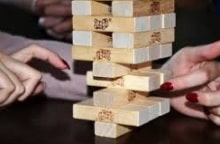Jenga is the name of a game devised by Tanzanian Leslie Scott . This woman, based in England , created the entertainment in the 1970s after discovering a similar pastime in Ghana , calling it Takoradi Bricks .
 Years later, the product became known as Jenga , a term that, in the Swahili language , means “to build.” At first, the game was marketed through the Harrod's store and then, in the mid- 1980s , it came to the United States through Parker Brothers , a Hasbro brand.
Years later, the product became known as Jenga , a term that, in the Swahili language , means “to build.” At first, the game was marketed through the Harrod's store and then, in the mid- 1980s , it came to the United States through Parker Brothers , a Hasbro brand.
The success of his creation allowed Scott to found his own company: Oxford Games . Beyond being a registered trademark , today Jenga is also the common noun used to refer to this pastime.
Jenga is played with 54 wooden pieces measuring 1.5 x 2.5 x 7.5 centimeters . To start the game, build an 18-level tower with 3 blocks per level . Each player, in turn, has to remove a piece from a lower level and place it in the upper sector of the construction using only two fingers. The player who, by removing or placing a block, causes the tower to collapse, loses .
More and more people around the world, both children and adults, choose to play Jenga. They do it fundamentally because it is a very fun proposal. However, you must know that it also brings with it a notable series of benefits. Among the most significant we can highlight the following:
-Without a doubt, like any board game, it is a great way to spend time with family, friends or loved ones.
-Helps improve concentration levels.
-No less significant is the fact that it helps any player develop their analytical skills.
-In the same way, it is considered a very useful tool for children, from an early age, to learn to make decisions and assume their consequences.
-It is also very useful to improve one's capacity for patience.
-Among the main benefits of playing Jenga is that it allows you to develop coordination and, specifically, manual coordination.
Improving the sense of logic and the perception of space are other great advantages that this game allows you to enjoy.
Over the years, Jenga has been modified. Thus, although we can find it in its most classic version, we can also buy it with certain advances in the pieces. Specifically, they can have numbers and colors that can determine the order in which they must be removed from the tower.
Jenga is known worldwide. In Argentina , for example, the host Gerardo Sofovich played on his TV show before famous guests, gathering millions of people in front of the television who vibrated with the challenges.
Nowadays you can even dabble in Jenga virtually thanks to digital games . There is also the trend known as jenga food , which consists of arranging food on the plate like a jenga tower.
